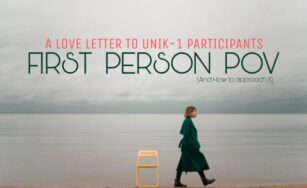A love letter to UniK-1 participants from Shankar Hosagoudar:
First of all, a pat on the backs of those who participated in UniK-1, arguably one of our toughest prompt with an added challenge of writing from First person point of view. Some stories (including the winning one) were excellent, some were good and some were good attempts at telling a story.
So what is the difference between second and third even though they sound same?
I have mentioned this many times in my comments (Which are sometimes unnecessarily elaborate) to not underestimate the re-writing part of writing. It’s okay if your first draft is nowhere close to what you had in mind, but it’s not okay to stick with it if you are not satisfied. Firstly, before even typing your first letter, make peace with the fact that crappy first drafts are unavoidable (I would have liked to use a more pungent adjective but fearing Mithru, I stuck with ‘crappy’). The bigger deal is to turn that into a coherent story and get it as close to your original vision.
Choosing First person POV (Told from ‘I’ perspective, usually by the central character) can be good for stories that are deeply personal and emotional, but it can also be limiting (Btw, Kudos to Yatindra for subverting this limitation by not narrating his story from the titular hero, nice touch).
First person POV need not be told from POV of the Protagonist, it can also be a secondary character – someone who can relate his or her experiences within the context of the story and usually has a relationship with the protagonist or it can be an Observer – someone who witnesses the story but has a limited or no participation in the happenings. (Do not confuse this with third person POV, observer usually chooses to add personal pronouns – I, Me, and Myself to inject commentary).
Some of you have mixed two interchangeable (yet distinct) narrative devices – Point-Of-View and Perspective. Ask yourselves two questions:
Who is telling your story?
How is he/she telling your story?
That’s the basic difference between the two. Perspective is how the characters views and process what’s happening within the story. In first person POV, it’s a gift and when used wisely, can do wonders. This may sound stupid and tedious, but try to write your story from both the perspectives (Protagonist and Antagonist/Any major character). In this way, your character motivations are more rounded. One of this will definitely go to recycle bin, but, it will give you a better story.
If you are writing your first story in first person POV, avoid present tense (it’s awkward), unless you are Suzanne Collins. However, if you feel there is a huge reason behind it then why not.
Finally, one thing I observed was the love for backstories. Your POV character is like an iceberg, we understand this, we know that there is more to him/her than what’s happening within the story but considering we have 1000 words at our disposal ( Not sure whether this is the right word), keeping the backstory to the background will improve your story. Take out any references to the backstory that don’t advance your story. Do not front load your backstory, we know that it’s safe to do so, but keep in mind that your story needs to catch your reader’s interest immediately. Begin your story at an exciting point and spread out your references.
Before saying good bye, Use this platform to experiment, it’s okay if you fail. It’s time to exorcise that demon which stops you from writing. Writers must write.
All the best for upcoming ArtoonsInn events and Nanowrimo (try it, it’s totally cool).







